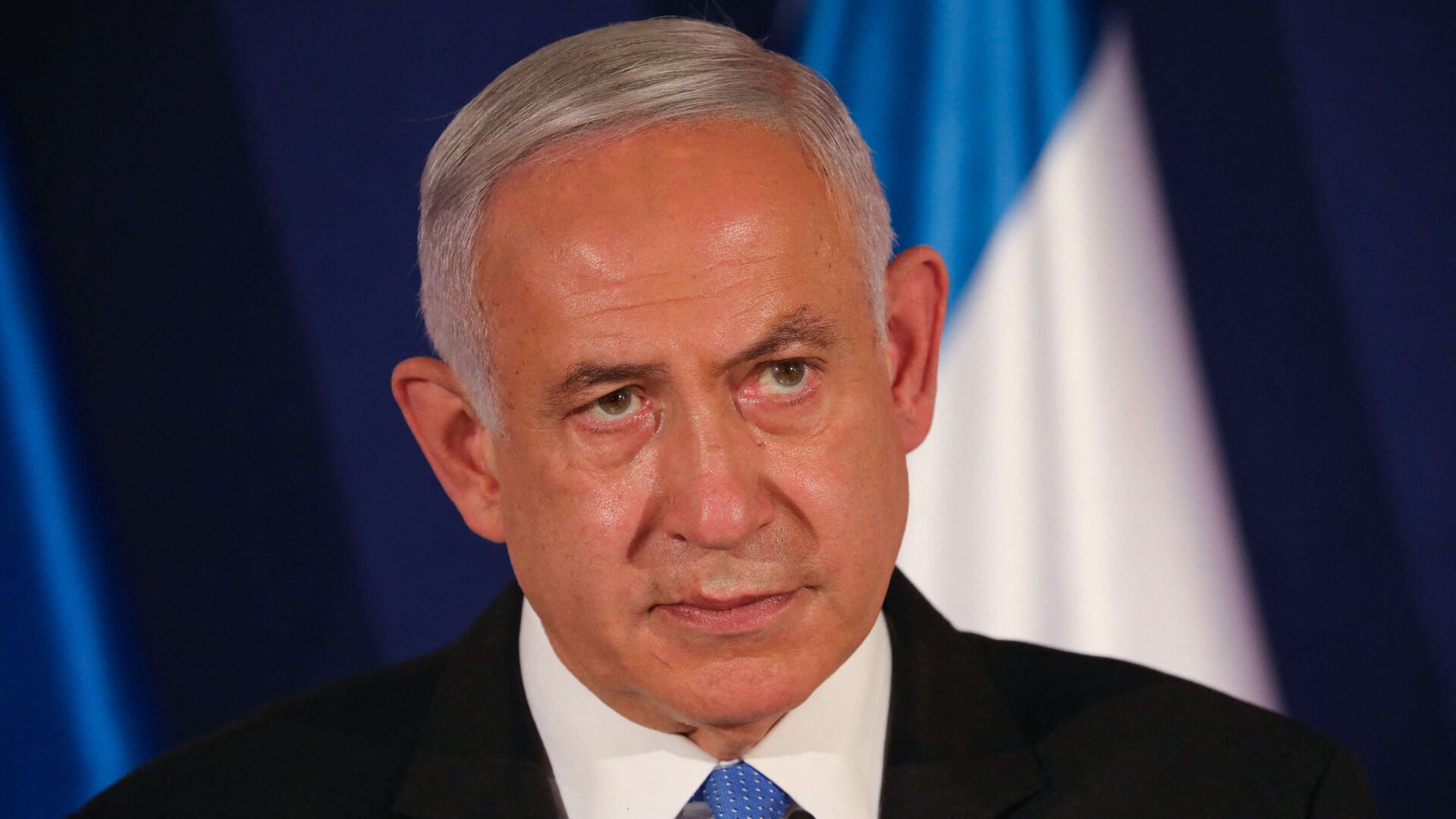https://sputnikglobe.com/20220701/arab-israeli-community-ready-to-stand-up-against-netanyahu-as-they-prepare-for-his-return-1096851800.html
Arab-Israeli Community Ready to Stand Up Against Netanyahu as They Prepare for His Return
Arab-Israeli Community Ready to Stand Up Against Netanyahu as They Prepare for His Return
Sputnik International
A recent poll shows that the Likud party of ex-Israeli PM Benjamin Netanyahu, would get 34 seats out of 120 in the next election, 4 places more than in the... 01.07.2022, Sputnik International
2022-07-01T05:23+0000
2022-07-01T05:23+0000
2023-01-15T17:26+0000
middle east
benjamin netanyahu
knesset
israel
https://cdn1.img.sputnikglobe.com/img/07e5/06/05/1083079155_0:0:3072:1728_1920x0_80_0_0_492a9afe47cf5c63e90d0fe689318fcc.jpg
On Thursday, Israel's parliament, the Knesset, dissolved itself after a number of failed attempts earlier this week.As a result, Israel will go to the polls on 1 November, for the fifth time in three years.Nothing SurprisingOdeh Bisharat, an Israeli Arab publicist and journalist, says he wasn't surprised by the decision to dissolve the Parliament, adding that the rest of the Arab community shared his reaction.Since the moment of its inception in mid-June of 2021, the Naftali Bennett coalition, comprised of eight parties with starkly contrasting ideologies, has struggled to pass any legislation.It couldn't pass a law that would prevent a person with criminal charges from running for PM. They also failed to agree on the renewal of the criminal laws in Judea and Samaria and these are only two of way too many examples.Now, after the fall of the government and the stepping down of Bennett, the leadership role has been taken by his partner Yair Lapid, who served as Israel's foreign minister. However, Bisharat says his coming to power is not expected to make any significant changes in the country's policies.Preparing for a Come-BackThat happiness, however, might not last long. Recent polls suggest that the former prime minister Netanyahu might be making a come-back. If surveys are accurate, the leader of the Likud party would get 34 out of 120 seats in the Israeli chamber.His natural partners, the Ultra-Orthodox parties, currently have 24 spots, something that catapults Netanyahu to 58 seats, three spots short of forming a government.On Wednesday night, then Prime Minister Bennett announced he would not run in the upcoming elections. The helm of his Yamina party will be taken by Ayelet Shaked, the Interior Minister.Shaked is not against Netanyahu. She is hawkish like himself and sitting down in a conservative coalition under Bibi would make a perfect sense for her.Bisharat hopes it won't happen, but if it does, he says the liberal circles of Israel will join forces against him.The way it stands now, the merge will not happen. Mansour Abbas, the head of the Raam party, has already stated that he didn't reject the notion of sitting down with Netanyahu. This is primarily because he understood that to secure funds for the needs of the Arab community, he needs to cooperate with whoever takes the premiership seat.Meretz and the Labour parties might be too week to tackle Netanyahu, with polls projecting for them four and five seats respectively. And if this is the case, the opposition to Netanyahu might not be that strong after all.
israel
Sputnik International
feedback@sputniknews.com
+74956456601
MIA „Rossiya Segodnya“
2022
News
en_EN
Sputnik International
feedback@sputniknews.com
+74956456601
MIA „Rossiya Segodnya“
Sputnik International
feedback@sputniknews.com
+74956456601
MIA „Rossiya Segodnya“
middle east, benjamin netanyahu, knesset, israel
middle east, benjamin netanyahu, knesset, israel
Arab-Israeli Community Ready to Stand Up Against Netanyahu as They Prepare for His Return
05:23 GMT 01.07.2022 (Updated: 17:26 GMT 15.01.2023) A recent poll shows that the Likud party of ex-Israeli PM Benjamin Netanyahu, would get 34 seats out of 120 in the next election, 4 places more than in the previous round of March 2021. The coalition partners of Bibi, the Ultra-Orthodox parties, promise to garnish 24 more spots, and this means that the ex-PM is only three seats short of leadership.
On Thursday, Israel's parliament, the Knesset, dissolved itself after a number of failed attempts earlier this week.
As a result,
Israel will go to the polls on 1 November, for the fifth time in three years.
Odeh Bisharat, an Israeli Arab publicist and journalist, says he wasn't surprised by the decision to dissolve the Parliament, adding that the rest of the Arab community shared his reaction.
"The Arab public was expecting this government to fall, simply because the differences within it were too heavy and they couldn't agree on anything."
Since the moment of its inception in mid-June of 2021, the Naftali Bennett coalition, comprised of eight parties with starkly contrasting ideologies, has struggled to pass any legislation.
It couldn't pass a law that would prevent a person with criminal charges from running for PM. They also failed to agree on the renewal of the criminal laws in Judea and Samaria and these are only two of way too many examples.
Now, after the fall of the government and the stepping down of Bennett, the leadership role has been taken by his partner
Yair Lapid, who served as
Israel's foreign minister. However, Bisharat says his coming to power is not expected to make any significant changes in the country's policies.
"He will continue with the same occupation policy and will go on building in settlements," he explains. "He might become softer when it comes to the Arab population of Israel but I still don't have any hope. [What comforts me is the fact] that we will not have Benjamin Netanyahu around, a man who keeps on inciting."
Preparing for a Come-Back
That happiness, however, might not last long. Recent polls suggest that the former prime minister Netanyahu might be making a come-back. If surveys are accurate, the leader of the Likud party would get 34 out of 120 seats in the Israeli chamber.
His natural partners, the Ultra-Orthodox parties, currently have 24 spots, something that
catapults Netanyahu to 58 seats, three spots short of forming a government.
On Wednesday night, then Prime Minister Bennett announced he would not run in the upcoming elections. The helm of his Yamina party will be taken by Ayelet Shaked, the Interior Minister.
Shaked is not against Netanyahu. She is hawkish like himself and sitting down in a conservative coalition under Bibi would make a perfect sense for her.
Bisharat hopes it won't happen, but if it does, he says the liberal circles of Israel will join forces against him.
"He has been around for 12 years, and during that time we kept on rejecting him and his policies," explains Bisharat. "We will do it again, and maybe this time around we will see a better engagement of the [liberal parties like] Meretz or Labour. I am also hoping the Arab parties will get united, although that will depend on the agenda of each one of them."
The way it stands now, the merge will not happen. Mansour Abbas, the head of the Raam party, has already stated that he didn't reject the notion of sitting down with Netanyahu. This is primarily because he understood that to secure funds for the needs of the Arab community, he needs to cooperate with whoever takes the premiership seat.
Meretz and the Labour parties might be too week to tackle Netanyahu, with polls projecting for them four and five seats respectively. And if this is the case, the opposition to Netanyahu might not be that strong after all.


